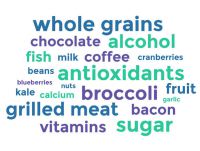Difference between revisions of "About-cancer/causes-prevention/risk/diet/zh"
Jump to navigation
Jump to search
(Created page with "*'''丙烯酰胺'''") |
|||
| Line 14: | Line 14: | ||
科学家研究了许多添加剂,营养素和其他饮食成分,以期可能与癌症风险相关。 这些包括: | 科学家研究了许多添加剂,营养素和其他饮食成分,以期可能与癌症风险相关。 这些包括: | ||
| − | *''' | + | *'''丙烯酰胺''' |
:Acrylamide is a chemical found in tobacco smoke and some foods. It can be produced when certain vegetables, such as potatoes, are heated to high temperatures. Studies in animal models have found that acrylamide exposure increases the risk for several types of cancer. However, there is no consistent evidence that dietary acrylamide exposure is associated with the risk of any type of cancer in humans. For more information, see the Acrylamide and Cancer Risk fact sheet. | :Acrylamide is a chemical found in tobacco smoke and some foods. It can be produced when certain vegetables, such as potatoes, are heated to high temperatures. Studies in animal models have found that acrylamide exposure increases the risk for several types of cancer. However, there is no consistent evidence that dietary acrylamide exposure is associated with the risk of any type of cancer in humans. For more information, see the Acrylamide and Cancer Risk fact sheet. | ||
Revision as of 15:20, 31 October 2019
饮食
许多研究已经研究了特定饮食成分或营养素与癌症风险增加或降低相关的可能性。 在实验室和动物模型中对癌细胞的研究有时提供了证据,表明分离出的化合物可能具有致癌性(或具有抗癌活性)。
但是,除了少数例外,对人类的研究尚未明确表明任何饮食成分都会导致或预防癌症。 流行病学研究的结果有时会比较患有和没有癌症的人的饮食,这表明患有和没有癌症的人在特定饮食成分上的摄入有所不同。
但是,这些结果仅表明饮食成分与癌症风险的变化有关,而不是饮食成分引起或引起风险的变化。 例如,患有和没有癌症的研究参与者除了饮食外,可能在其他方面也有差异,并且可能有其他差异解释了癌症的差异。
从流行病学研究中发现饮食成分与癌症风险降低相关的证据时,可以进行随机试验以验证这种可能性。 饮食组的随机分配可确保高营养素摄入量和低营养素摄入量之间的任何差异均归因于营养素本身,而不是其他未发现的差异。 (出于道德原因,当有证据表明饮食成分可能与罹患癌症的风险增加有关时,通常不会进行随机研究)。
科学家研究了许多添加剂,营养素和其他饮食成分,以期可能与癌症风险相关。 这些包括:
- 丙烯酰胺
- Acrylamide is a chemical found in tobacco smoke and some foods. It can be produced when certain vegetables, such as potatoes, are heated to high temperatures. Studies in animal models have found that acrylamide exposure increases the risk for several types of cancer. However, there is no consistent evidence that dietary acrylamide exposure is associated with the risk of any type of cancer in humans. For more information, see the Acrylamide and Cancer Risk fact sheet.
- Alcohol
- Although red wine has been suspected of reducing cancer risk, there is no scientific evidence for such an association. Also, alcohol is a known cause of cancer. Heavy or regular alcohol consumption increases the risk of developing cancers of the oral cavity (excluding the lips), pharynx (throat), larynx (voice box), esophagus, liver, breast, colon, and rectum. The risk of developing cancer increases with the amount of alcohol a person drinks. For more information, see the fact sheet on Alcohol and Cancer Risk.
- Antioxidants
- Antioxidants are chemicals that block the activity of other chemicals, known as free radicals, that may damage cells. Laboratory and animal research has shown that exogenous antioxidants can help prevent the free radical damage associated with the development of cancer, but research in humans has not demonstrated convincingly that taking antioxidant supplements can help reduce the risk of developing or dying from cancer. Some studies have even shown an increased risk of some cancers. For more information, see the Antioxidants and Cancer Prevention fact sheet.
- Artificial sweeteners
- Studies have been conducted on the safety of several artificial sweeteners, including saccharin, aspartame, acesulfame potassium, sucralose, neotame, and cyclamate. There is no clear evidence that the artificial sweeteners available commercially in the United States are associated with cancer risk in humans. For more information, see the Artificial Sweeteners and Cancer fact sheet.
- Calcium
- Calcium is an essential dietary mineral that can be obtained from food and supplements. Research results overall support a relationship between higher intakes of calcium and reduced risks of colorectal cancer, but the results of studies have not always been consistent. Whether a relationship exists between higher calcium intakes and reduced risks of other cancers, such as breast and ovarian cancer, is unclear. Some research suggests that a high calcium intake may increase the risk of prostate cancer. For more information, see the fact sheet on Calcium and Cancer Prevention.
- Charred meat
- Certain chemicals, called HCAs and PAHs, are formed when muscle meat, including beef, pork, fish, and poultry, is cooked using high-temperature methods. Exposure to high levels of HCAs and PAHs can cause cancer in animals; however, whether such exposure causes cancer in humans is unclear. For more information, see the Chemicals in Meat Cooked at High Temperatures and Cancer Risk fact sheet.
- Cruciferous vegetables
- Cruciferous vegetables contain chemicals known as glucosinolates, which break down into several compounds that are being studied for possible anticancer effects. Some of these compounds have shown anticancer effects in cells and animals, but the results of studies with humans have been less clear. For more information, see the Cruciferous Vegetables and Cancer Prevention fact sheet.
- Fluoride
- Fluoride in water helps to prevent and can even reverse tooth decay. Many studies, in both humans and animals, have shown no association between fluoridated water and cancer risk. For more information, see the Fluoridated Water fact sheet.
- Tea
- Tea contains polyphenol compounds, particularly catechins, which are antioxidants. Results of epidemiologic studies examining the association between tea consumption and cancer risk have been inconclusive. Few clinical trials of tea consumption and cancer prevention have been conducted and their results have also been inconclusive. For more information, see the fact sheet on Tea and Cancer Prevention.
- Vitamin D
- Vitamin D helps the body use calcium and phosphorus to make strong bones and teeth. It is obtained primarily through exposure of the skin to sunlight, but it can also be obtained from some foods and dietary supplements. Epidemiologic studies in humans have suggested that higher intakes of vitamin D or higher levels of vitamin D in the blood may be associated with a reduced risk of colorectal cancer, but the results of randomized studies have been inconclusive. For more information, see the Vitamin D and Cancer Prevention fact sheet.
